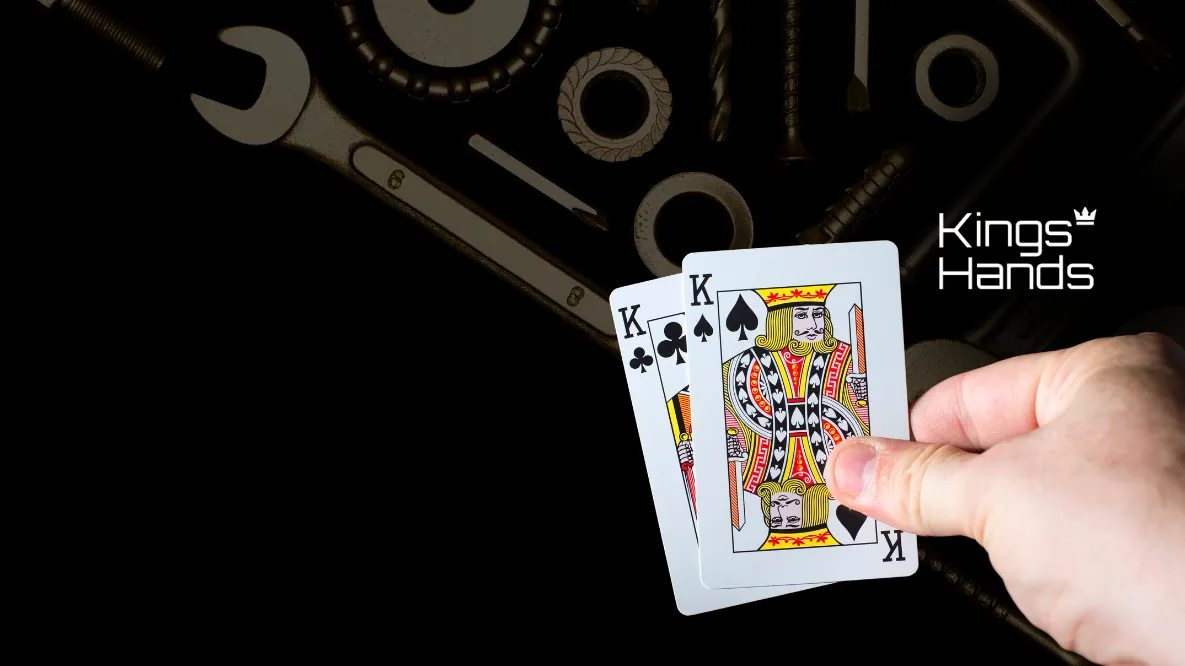Poker is a tough game, especially when you’ve just started playing. Even players who have been playing for years still make basic mistakes that are affecting their win rates. The biggest problem is that players, particularly new players, don’t know the mistakes they’re making, so they’re not able to rectify them!
Well, we’re here to put that right. We’ve listed the ten most common noob poker mistakes and provided some helpful tips on how to avoid making them in your next game. We’ve got an even split of preflop and postflop mistakes on show, so there’s something for everyone to learn.
Preflop
Preflop play is the foundation of the rest of your poker strategy, so it’s important you get it right. Despite its importance, many players still make basic errors that affect their game later in the hand. Let’s take a look at what those mistakes are.
1. Playing Too Tight From Late Position
When you’re first taught how to play poker, many players learn that “tight is right,” and while that’s true, some players take it too far. Preflop positions such as the HJ, CO, and BTN are some of the strongest positions in the game, and you should take advantage of this by playing as many hands as possible.
You should be playing at least 50% of your hands from the button, 30% of your hands from the CO, and 25% of your hands from the HJ when the action folds to you. If you’re not getting near these numbers, you’re missing out on value and not maximising your win rate from these strong positions.
2. Playing Too Loose From Early Position
On the other end of the spectrum, we have players who play too many hands from early position. Playing from positions such as UTG, UTG+1, and UTG+2 can be tricky, as they require players to play tight ranges and fold marginal hands that would be played from other positions. Some players can’t handle folding so many pretty hands like 65s, 86s, and J9s, and end up playing too many hands from these positions.
You should only be playing around 10-15% of hands from these positions, any more than that and your preflop range is too wide. When your preflop range is this wide, you will find yourself consistently losing money as you struggle to defend your wide range against preflop and postflop aggression.
3. Calling Too Much From The Blinds
Yes, we know, you’re getting a discount when playing from the blinds, but that doesn’t mean you can start calling any two cards in the hopes that you hit a hand! Beginners play far too many hands from the blinds and they play them too passively, particularly in the small blind.
The small blind is arguably one of the worst positions in poker as you have to pay 0.5bb every hand, you’re not closing the action (the BB is still left to act) and you’re guaranteed to be out of position postflop. By calling from the small blind, you add “not having the betting lead” to the list of issues you face! Instead, you should play a tight, aggressive strategy from the small blind that involves a lot of 3-betting, especially against late position raises.
While calling from the big blind with a wide range isn’t as egregious as the small blind, it can lead to issues that impact your win rate. It’s far too easy to get into a habit of calling with a wide range, and then check/folding when you miss. It may not seem like you’re losing much by doing this, but it quickly adds up over a session! To counter this, mix in more 3-bets into your BB defence range to put more pressure on the preflop raiser.
4. Not 3-Betting Enough
This leads us to a wider issue that beginners have preflop, they don’t 3-bet enough! 3-betting can be daunting when you first start playing; you’re building a bigger pot, and you’re opening the action for the original raiser to 4-bet you. However, part of a solid preflop strategy is having a solid 3-betting range from all positions.
If you’re not sure where to begin when it comes to opening up your 3-betting range, start by looking at your 3-betting ranges for each position and increase them by 50% – e.g. if you’re currently 3-betting 6%, increase it to 9%. Doing this allows you to become more familiar with playing 3-bet pots.
5. Calling 3-Bets Too Wide Out Of Position
Another mistake that beginners often make is calling too many 3-bets while out of position. Playing out of position without the betting lead is extremely tough, as you’ll often be facing a c-bet from the preflop aggressor. It’s hard to defend these situations when you haven’t hit the flop, so many players end up check/folding when they miss.
Routinely calling 3-bets out of position and check/folding when you miss will cost you significantly in the long run. To stop this leak, tighten your calling range; by calling with fewer hands, your range will be stronger when you make it to the flop, making it easier to defend against c-bets.
Postflop
Players aren’t just making preflop mistakes; plenty of players make simple mistakes once the community cards have been revealed. If you want to avoid making these mistakes, take a look below.
6. Playing Too Passively Against C-bets
One of the most common mistakes beginners make is playing too passively when they’re not the preflop aggressor. They fall into a habit of just calling with their good hands and their draws, scared of building the pot with a raise. Doing this will have disastrous consequences for your win rate, as you’ll miss out on value when you have a strong hand and end up relying on making your hands when you have a draw.
If you find yourself in this habit, you need to start playing more aggressively against your opponent’s c-bets. Instead of just calling with your draws, start raising with them instead and put the pressure back on your opponents. Not only does this give you two ways to win the pot, but it also allows you to raise more often for value as your range is balanced between value hands and bluffs.
7. C-Betting Too Often
Another common mistake made by beginners is c-betting too often. They see the power of the c-bet when they’re up against them, and think that the best thing to do is c-bet in every hand. While there are certainly a lot of benefits that come with c-betting, doing so too often will cost you dearly in the long run.
When you’re the preflop aggressor, take a beat and consider the situation before c-betting. Ask yourself the following questions before putting in your c-bet:
- How many players are in the hand? If there are more than two opponents, c-betting with a wide range is not advised, as the chances that someone has a strong hand is much greater.
- Who is this flop good for? If it’s good for your opponent, you’ll find that your c-bet will face strong resistance.
- What kind of player are you playing against? If they’re a loose-aggressive player, the chances of your c-bet working will be very slim!
If you don’t think the situation is favourable for you, tighten up that c-betting range.
8. Not Bluffing Enough
We get it, bluffing is a scary thing to do, especially when you’re a beginner. Putting out a large bet knowing that your hand is no good if you get called is a tough thing to do, and it can take a long time before you feel truly comfortable making a bluff in poker. However, this doesn’t mean that you shouldn’t do it!
Think of the alternative, if you don’t bluff, you force yourself into showing down the losing hand. In this situation, you have no chance of winning the pot, but when you bluff, you’re at least giving yourself a chance. It’s always better to bluff with equity, so rather than checking and trying to hit your draw, throw out a bluff instead.
9. Calling Rivers Too Often
In low-stakes poker games, a good rule of thumb is that players don’t bluff the river enough. The pot is at its biggest, and as we just discussed, many players find it hard to pull the trigger on that final bullet. This leads to players’ ranges being heavily weighted towards value when they bet the river.
Given this information, you should fold rivers more often than you call them. It can be hard to fold on the final street, never knowing what your opponent had, but trust us; it will save you a significant amount of money in the long run. Stick to calling with a strong range, and throw those bluff-catchers in the muck.
10. Not Value Betting Thinly Enough
One of the most important parts of being a winning poker player is getting value when you have the best hand. Now, this is easy when you have the nuts or close to it, but what about when you have second pair or a weak top pair hand? Too many players err on the side of caution and check down these marginal hands in fear of running into a stronger hand.
Instead, you should be looking to value bet whenever you think your opponent has worse hands that will call your bet. Sure, every so often your opponent will have a better hand and you’ll lose a bigger pot than you would have, but in the long run, you’ll make more money from the times you’re called.
So if you’re in a marginal position, consider whether your opponent has any worse hands in their range that will call you if you bet. If they do, make that thin value bet!
Summary
It’s easy to make mistakes, particularly when you’re a new player, but we’re here to help you eliminate some of the basic mistakes that have the biggest effect on your win rate. As long as you avoid these noob mistakes and follow our tips, you should see a marked improvement in your results at the table!





















